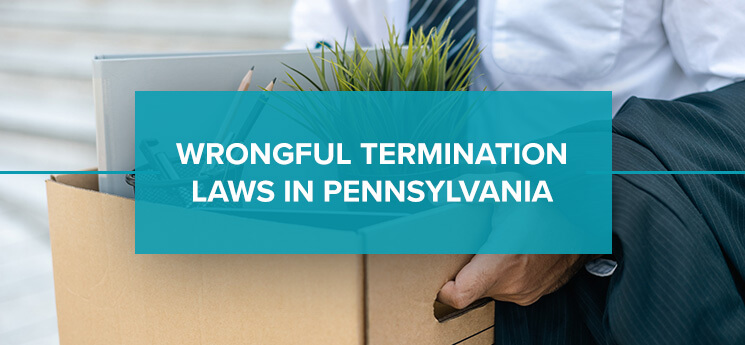Wondering whether you can sue for wrongful termination in Pennsylvania? You’ve come to the right place. Being fired from your employment can be financially and emotionally challenging, particularly if the termination was unjust. Depending on the facts of the case, you may have a claim against your employer. Federal and state laws protect Pennsylvania workers against various forms of unlawful termination, including those based on discrimination.
The employment lawyers at Weisberg Cummings can examine your case to determine whether you have a valid claim. We can also develop practical strategies and provide legal representation to protect your interests. Learn more about wrongful termination in Pennsylvania.
What Is Wrongful Termination?
Wrongful termination occurs when an employer or their representative unlawfully terminates an employee’s employment. There are numerous reasons for such actions, and they could be based on discriminatory factors such as gender, race, disability, age, or religion. Some employers also fire employees as retaliation for the employee taking legally protected leave, filing a sexual harassment claim, or exercising their legal rights in any other way.
State and federal laws protect workers against unlawful termination of employment. Employers must adhere to these laws and the terms of employment. Employees who believe they have a valid claim may sue or negotiate a settlement with the employer.
The Difference Between Wrongful Termination and Unfair Termination
While you can sue your former employer for wrongful termination in Pennsylvania, you cannot sue for unfair termination. This is why it is essential to know the difference. Wrongful termination occurs when you are fired for an illegal or unethical reason, whereas unfair termination occurs due to nepotism, favoritism or simple dislike. Though you may be angry and frustrated because your employer fired you based on unfair treatment, you cannot sue for unfair termination.
What Are the Wrongful Termination Laws in Pennsylvania?
State and federal laws regulate employment relations in Pennsylvania. Case law or previous judicial decisions and general principles of law can also determine the legality of employment termination. These laws are complex, so it’s best to consult an attorney for professional support. Below are some examples:
1. Equal Employment Opportunity (EEO) Laws
EEO laws encompass a group of federal legislation prohibiting discrimination in the workplace. Examples include Title VII of the Civil Rights Act, the Pregnancy Discrimination Act, the Age Discrimination Act, the Americans with Disabilities Act and the Equal Pay Act. Two agencies under the United States Department of Labor (DOL) handle EEO monitoring and enforcement — the Office of Federal Contract Compliance Programs and the Civil Rights Center (CRC). These agencies oversee different activities and have varying responsibilities.
2. Pennsylvania Human Relations Act
This state legislation prohibits certain discriminatory practices in employment and other settings. The law extends to the termination of employment on the basis of race, religion, ancestry, sex, age, disability and other protected categories. The Pennsylvania Human Relations Act also makes it illegal for employers to retaliate against an employee for enforcing their rights or challenging unlawful conduct.
3. Pennsylvania Statute of Limitations for Wrongful Termination
Statutes of limitation are the laws that prescribe the period for bringing various actions to court. In the Keystone State, the time limits to file wrongful termination claims can be very short. If you believe you were fired for illegal discrimination, you usually have 180 days to preserve your claims with the Pennsylvania Human Relations Commission. In other situations, you may have anywhere from 30 days to two years to file a wrongful termination claim.
Missing the deadline means losing your right to sue — it’s like an expiration date for a lawsuit. Unless the employer willingly agrees to reinstate or compensate you for the losses, there is generally no obligation to provide any form of remedy. Contact an attorney as soon as possible to assess your case and file your claim.
4. Judicial Precedents and General Legal Principles
Previous judicial decisions on the same matter with similar facts influence court decisions. Additionally, general principles of law, such as the laws of contract, can determine parties’ rights, responsibilities and liabilities. These laws are complex, but lawyers are trained to learn and use them in resolving disputes. An experienced employment attorney can examine your case to determine whether you have a valid cause of action and apply the relevant laws to help you achieve the desired outcome. A cause of action is the combination of facts that entitles a person to a legal remedy.
What Counts as Wrongful Termination in Pennsylvania?
Pennsylvania is one of many at-will states, meaning that unless you are in a union or have a specific contract of employment, you can be fired or demoted at any time without cause or for any legal reason. However, there are some exceptions to this rule, including illegal and unethical reasons. Possible instances of discrimination include:
- Sexual orientation discrimination
- Veteran status discrimination
- National origin discrimination
- Race or color discrimination
- Religious discrimination
- Disability discrimination
- Gender discrimination
- Age discrimination
- Retaliation
If you are fired because you are pregnant, have a disability, are on maternity leave or complained about illegal discrimination, you may have a wrongful termination case. In addition to discriminatory reasons, you cannot be fired for:
- Standing up for your rights: If you speak up for yourself or co-workers in certain ways, such as by reporting safety violations or sexual harassment, you cannot be fired for this reason. This is also true if you assist in a discrimination investigation by testifying in court or speaking to investigators.
- Taking leave you are entitled to: If you are entitled to leave under the Family and Medical Leave Act (FMLA), military leave or jury duty leave, you cannot be fired for taking it. For example, an employer cannot retaliate against you for taking your unpaid jury duty leave. However, not every employee is entitled to these types of leave, so be sure you are eligible.
- Refusing to commit or abet a crime: Pennsylvania courts want to protect the public interest, including employees who refuse to commit or abet a crime for an employer. If your employer pressured you to commit perjury or avoid reporting regulatory violations, you cannot be fired for refusing to do so.
- Making a request you are entitled to make: Your employer cannot fire you if you request reasonable accommodations. Under the Americans with Disabilities Act (ADA), if you are a worker with a disability, you are entitled to reasonable accommodations in the workplace that allow you to do your job effectively. Similarly, you cannot be fired because you filed a workers’ compensation claim.
Signs You May Have a Wrongful Termination Case
If you have recently been fired, it can be hard to determine whether you were wrongfully terminated. Though employers can fire you without cause, they may give you a reason to make the termination appear legitimate. If you have noticed any of the following signs, you may want to reach out to an attorney:
- A pattern of discriminatory behavior: If you were subjected to discriminatory remarks and a demotion before your termination, this could show a pattern of discriminatory behavior, which may have led to your wrongful termination.
- Suspicious timing: If the timing for your termination is suspicious, you may have a wrongful termination case. For example, if you were on the verge of retiring with full benefits or were fired soon after exposing the company’s illegal activities, your situation deserves further investigation.
- No cause for the termination: If you consistently received positive performance reviews and have been with your employer for a while, and they fire you without any reason given, this could be a red flag. If similar employees remain employed or receive promotions and raises, this may signify wrongful termination.
How to Handle Wrongful Termination Cases
You can deal with wrongful termination cases in several ways. These options have varying legal significance, and an attorney can help you determine which is appropriate, given the circumstances:
- File a complaint: The first option is to file a complaint with the Equal Employment Opportunity Commission (EEOC) or the Pennsylvania Human Relations Commission (PHRC). The agency will investigate the allegations and attempt a settlement. If the attempted settlement fails, the EEOC may file a lawsuit or issue a notice of right to sue, allowing you to commence legal proceedings in court.
- Settle the dispute: Sometimes, employers agree to settle the dispute out of court. This settlement is different from the one the EEOC oversees. It’s a private negotiation process where the parties attempt to resolve the matter amicably, before or after a lawsuit.
- Initiate a lawsuit: You may commence legal action against the employer to seek legal remedies. Like the other dispute resolution mechanisms discussed, litigation can be technical, so hiring a lawyer is best. The employer has the right to file a response or defense, so you should prepare adequately.
How to Conduct a Wrongful Termination Lawsuit
Wrongful termination cases in Pennsylvania are conducted as civil actions. A civil action is a lawsuit between private persons like individuals and non-human entities like companies or corporations. The action commences when you file a complaint at the court of competent jurisdiction. Once you file the suit, you must serve the employer with the court processes.
Your employer may file a response or defense to support their decision. After that, the court will schedule a date for trial, where both parties will present evidence and make submissions to obtain a favorable judgment. The court will give the relevant orders depending on the findings. Note that the specifics of the procedure are much more complex, with multiple rules and intricacies.
Available Legal Remedies in a Wrongful Termination Lawsuit
Several legal remedies are available in a wrongful termination lawsuit. The options include reinstatement, back pay and lost benefits, and damages or a combination of them:
- Reinstatement: The court may order your employer to reinstate you to your previous position. While potentially beneficial, assess whether returning to the workplace is feasible or desirable. For example, if the relationship between the employer and employee is strained, other legal remedies could be better options.
- Back pay and lost benefits: The court may order the employer to pay lost wages and benefits if they are found liable for unlawful termination. Back pay is the wages you would have earned if you had remained in the position. Lost benefits are the privileges or perks attached to your position in the workplace, like health insurance and retirement contributions.
- Damages: The court may order the employer to compensate you for losses. Other kinds of damages, including punitive damages, are designed to punish the employer for acting maliciously or recklessly. Some laws allow for damages to compensate you for your emotional distress, while others may provide for a specific amount of money, referred to a liquidated damges, to an employee who proves that their employer knowingly violated the law. An experienced employment attorney will be able to explain the types of remedies available for each type of claim.
How Can Weisberg Cummings Help?
At Weisberg Cummings, P.C., we have decades of experience in employment matters. We understand the wrongful termination laws in Pennsylvania, and we can ensure you can fight for your case and recover the settlement you deserve. Discrimination laws differ from state to state, so having a professional who understands the laws in Pennsylvania is crucial.
With a qualified attorney on your side, the process can move quickly, especially if this is the first complaint made against your former employer. A lawyer will know which evidence to gather and research and how to strengthen your case.
Learn More About Pennsylvania Wrongful Termination Laws
If you are concerned about your termination and believe you may have been discriminated against, you deserve legal counsel to fight your case. You have protections and rights under the law, and you should not be fired based on your age, gender, race, national origin, pregnancy or religion.
At Weisberg Cummings, P.C., our employment lawyers can help determine whether you have a wrongful termination case. An experienced lawyer can help you pursue your case while you seek other employment. If you believe you may have a wrongful termination case, contact us today to schedule a free consultation with our experienced employment lawyers.



